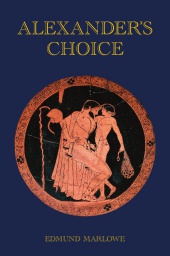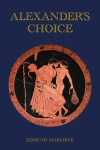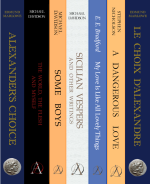Alexander's Choice (book): Difference between revisions
No edit summary |
|||
| (47 intermediate revisions by 3 users not shown) | |||
| Line 1: | Line 1: | ||
'''Alexander's Choice''' is a novel set at Eton College in 1983-4 by Edmund Marlowe, an old boy of the school, as his début work. It tells of the love affair of Alexander Aylmer, a new boy at the school aged 13-14 and Damian Cavendish, a new, young English master. | [[Image:Alexanders-choice-edmund-marlowe-paperback-cover-art.jpg|170px|right]] | ||
'''Alexander's Choice''' is a novel set at [[Boarding school|Eton College]] in 1983-4 by Edmund Marlowe, an old boy of the school, as his début work. It tells of the love affair of Alexander Aylmer, a new boy at the school aged 13-14 and Damian Cavendish, a new, young English master. | |||
The subject of sex between older and younger boys at Eton has been briefly alluded to in previous fiction, notably in ''The Fourth of June'' by David Benedictus (1962) | The subject of sex between older and younger boys at Eton has been briefly alluded to in previous fiction, notably in ''The Fourth of June'' by David Benedictus (1962) <ref>Benedictus, David (1977). The Fourth of June. London: Anthony Blond. London: Sphere. ISBN 978-0-7221-1588-6</ref> and ''The Link'' by Robin Maugham (1969)<ref>Maugham, Robin (1969). The Link. London: William Heinemann. ISBN 978-0-4344-5504-1</ref>, | ||
but this is the only novel to have made boylove there its main theme. | but this is the only novel to have made [[boylove]] there its main theme. | ||
==Plot introduction== | |||
Sweet-natured and good-looking, thirteen-year-old aristocrat Alexander Aylmer goes to prestigious Eton College in September 1983 full of optimism. He soon discovers new friends, interesting teachers and the hopes and frustrations that arrive with puberty. | |||
Timid Julian Smith, three years older, nurses two secrets he is terrified the other boys might discover: his humble background and his being hopelessly in love with Alexander. His father Alfred is a removals man who has saved all his life to send him to Eton. His own German-Jewish father had brought him up to be anglophilic, a sentiment reinforced by his teenage years in Sachsenhausen as the sole survivor of his family. | |||
Julian has been attracted to younger boys before, but never dared act on his feelings. Now torn between the strength of his feelings and fear of attracting suspicion and derision, he makes painfully little progress in his attempts to befriend Alexander until luck intervenes. Alexander becomes unfairly suspected of a spate of thefts in their house. Though exonerated in most boys’ eyes, he is viciously cornered by the house bully who had once nearly ruined Julian. Julian fortuitously appears and comes furiously to his rescue, thus immediately winning Alexander’s passionately loyal friendship. | |||
Suddenly though, Alexander’s adored mother dies of a heart-attack. Back at school after her funeral, his friends are sympathetic, but put off by his broken heart. Only Julian remains. Julian postpones furthering his erotic aspirations until the next (summer) term, with which most of the story is concerned. | |||
Alexander guesses Julian’s feelings. Though not physically attracted by him, he decides to indulge him, influenced by Mary Renault’s fictional depiction of the ideal friendship between his revered ancient namesake and Hephaistion. Julian is determined, but so over-cautious he risks losing everything he cares about. | |||
Other characters are soon drawn in. Their housemaster, alerted to the unusual friendship, writes to Julian’s father decrying it. Despite knowing the latter to be deeply sympathetic, Julian is unable to admit his feelings to him and is terrified by the possible involvement of his puritanical, feminist mother Denise, otherwise too embroiled in her successful career as a campaigner against child sex abuse to notice her own child’s anguish. | |||
Alexander also has a new, young English teacher, Damian Cavendish. Romantically only consciously interested in women, he is, however, aware of a special affinity with boys that has brought him enthusiastically to Eton. He burns too with an altruistic longing to find himself badly needed. He has already had one highly emotional encounter with Alexander, which has left him anxiously concerned for the boy’s happiness and Alexander highly receptive to his influence. | |||
Each of the protagonists brings his own unique experience to bear on the unfolding drama, but through inadequate understanding of the new moral panic about teenage sexuality, none are remotely prepared for what follows. The final consequences shatter lives and are so heart-wrenching that Alfred, awakened to his most horrifying memories of the Third Reich, brings the story to a conclusion with his understanding that his anglophilia had been a deluded response to the inhumanity of man. | |||
==Major themes== | |||
[http://www.amazon.com/Alexanders-Choice-Edmund-Marlowe/product-reviews/1481222112/ref=cm_cr_dp_see_all_btm?ie=UTF8&showViewpoints=1&sortBy=bySubmissionDateDescending Reviews at amazon.com] | ''Alexander's Choice'' challenges popular assumptions as to what might drive a pubescent boy and a young man to fall in love. Alexander and Damian slip unconsciously into loving one another without drawing conclusions about their sexual identity. They are both inspired by the ancient Hellenic ideals of pederasty, vividly illustrated in a short story and a dream, and remain as unconscious of the idea of sexual orientation as their classical exemplars. Despite the intensity of their passion for one another, it never occurs to either to question his attraction to the opposite sex, neither considers himself gay, and they simply assume until the end that they will one day find wives. | ||
A wide variety of attitudes to homosexuality and boylove in particular are explored through the various attitudes of the other boys and schoolmasters, parents, police, social workers and finally the general public, and in some cases the development of these attitudes over time is also examined. | |||
The theme of the searingly powerful last two chapters is the hopelessness of the inevitable clash once a love founded in timeless ideals was exposed to the social realities of 1984: | |||
<blockquote> | |||
Transported to the 1980s, however, age-stratified relationships are not merely frowned-upon, but pose a threat to hierarchy, and more specifically to the carefully-cultivated image of The Child which serves as the rhetoric of every acknowledged politics; the phantasmal beneficiary of every political intervention. The image of 'The Child' is not simply the last taboo, but also the last possibility of taboo, the last universal mechanism for imposing order upon a decaying world. To contemporary culture, then, Alexander is not a living swarm of affections and passions, but rather an inert categorization, a strategic image - one which must be protected at any cost. Consequently, the irony of the novel's title is that the 'Alexander' visible to society is not entitled to 'choose' anything: as a fixed image that operates in the service of culture, he is always-already stripped of voice and life. <ref>[http://www.amazon.co.uk/Alexanders-Choice-Edmund-Marlowe/dp/1481222112/ref=sr_1_1?ie=UTF8&qid=1360749088&sr=8-1 Review by "Son of Nietzsche" on amazon.co.uk, 31 January 2013],</ref> | |||
</blockquote> | |||
==Main characters== | |||
*Alexander Aylmer, a stunning beauty of 13-14, intelligent, loyal, passionate and self-willed, with a great interest in ancient history. | |||
*Rupert Drysdale, Alexander's best friend of his own age and a worldly influence on him. | |||
*Julian Smith, aged 16-17, kind but ordinary, he is condemned by his timidity to guile and thus never to fulfil his longings. | |||
*Guy Cowburn, a snobbish bully in Julian's year | |||
*Peter Leigh, Guy's principal crony and a thief. | |||
*Damian Cavendish, aged 22-23, darkly handsome, soft-hearted and charming, he has been drawn back to Eton to teach by happy memories of his successful time there as a boy. | |||
*Jack Hodgson, housemaster of Peyntors, Alexander's house at Eton, an impressive classics master too buttoned-up and uninterested in boys to be effective in his house. | |||
*Mr. Allenby, the Head Master of Eton. | |||
*Sir Henry ("Hal") Aylmer, Alexander's father, a Lord Justice of Appeal. | |||
*Penelope Aylmer, Alexander's mother, warm and loving, her maternal attitudes are subtly contrasted with those of Julian's mother, who is almost her antithesis. | |||
*Alfred Smith alias Wertheimber, Julian's adoring father. As a perennial outsider, he is the author's foil for exposing the cruelty and hyopcrisy of society. | |||
*Denise Smith, Julian's mother, a feminist social worker whose prominence as a campaigner against "child sex abuse" only becomes clear towards the end. | |||
*Walter Cavendish, Damian's father, an aristocratic ex-radical. | |||
*Jim Hatchet, a Detective Inspector. | |||
==References== | |||
{{Reflist}} | |||
==See also== | |||
*[[Reading list category literature]] | |||
==External links== | |||
* [http://www.amazon.com/Alexanders-Choice-Edmund-Marlowe/product-reviews/1481222112/ref=cm_cr_dp_see_all_btm?ie=UTF8&showViewpoints=1&sortBy=bySubmissionDateDescending Reviews at amazon.com] | |||
*[https://www.amazon.com/Alexanders-Choice-Edmund-Marlowe-ebook/dp/B0BPTMTRFL/ref=sr_1_1?crid=289O60MW8T0Z1&keywords=alexander%27s+choice&qid=1699888975&s=books&sprefix=Alexander%27s+Choice%2Cstripbooks%2C144&sr=1-1 Alexander's Choice (available on Amazon)] | |||
*[http://www.lrb.co.uk/blog/2013/07/15/nick-richardson/eton-life/ London Review of Books ] | |||
{{Navbox Edmund Marlowe|collapsed}} | |||
{{Navbox Arcadian Dreams|collapsed}} | |||
[[fr:Alexander’s choice (Edmund Marlowe)]] | |||
[[Category:Fiction|Alexander's Choice]] | |||
[[Category:English literature]] | |||
[[Category:Boylove in literature|Alexander's Choice]] | |||
Latest revision as of 17:12, 11 September 2024

Alexander's Choice is a novel set at Eton College in 1983-4 by Edmund Marlowe, an old boy of the school, as his début work. It tells of the love affair of Alexander Aylmer, a new boy at the school aged 13-14 and Damian Cavendish, a new, young English master.
The subject of sex between older and younger boys at Eton has been briefly alluded to in previous fiction, notably in The Fourth of June by David Benedictus (1962) [1] and The Link by Robin Maugham (1969)[2], but this is the only novel to have made boylove there its main theme.
Plot introduction
Sweet-natured and good-looking, thirteen-year-old aristocrat Alexander Aylmer goes to prestigious Eton College in September 1983 full of optimism. He soon discovers new friends, interesting teachers and the hopes and frustrations that arrive with puberty.
Timid Julian Smith, three years older, nurses two secrets he is terrified the other boys might discover: his humble background and his being hopelessly in love with Alexander. His father Alfred is a removals man who has saved all his life to send him to Eton. His own German-Jewish father had brought him up to be anglophilic, a sentiment reinforced by his teenage years in Sachsenhausen as the sole survivor of his family.
Julian has been attracted to younger boys before, but never dared act on his feelings. Now torn between the strength of his feelings and fear of attracting suspicion and derision, he makes painfully little progress in his attempts to befriend Alexander until luck intervenes. Alexander becomes unfairly suspected of a spate of thefts in their house. Though exonerated in most boys’ eyes, he is viciously cornered by the house bully who had once nearly ruined Julian. Julian fortuitously appears and comes furiously to his rescue, thus immediately winning Alexander’s passionately loyal friendship.
Suddenly though, Alexander’s adored mother dies of a heart-attack. Back at school after her funeral, his friends are sympathetic, but put off by his broken heart. Only Julian remains. Julian postpones furthering his erotic aspirations until the next (summer) term, with which most of the story is concerned.
Alexander guesses Julian’s feelings. Though not physically attracted by him, he decides to indulge him, influenced by Mary Renault’s fictional depiction of the ideal friendship between his revered ancient namesake and Hephaistion. Julian is determined, but so over-cautious he risks losing everything he cares about.
Other characters are soon drawn in. Their housemaster, alerted to the unusual friendship, writes to Julian’s father decrying it. Despite knowing the latter to be deeply sympathetic, Julian is unable to admit his feelings to him and is terrified by the possible involvement of his puritanical, feminist mother Denise, otherwise too embroiled in her successful career as a campaigner against child sex abuse to notice her own child’s anguish.
Alexander also has a new, young English teacher, Damian Cavendish. Romantically only consciously interested in women, he is, however, aware of a special affinity with boys that has brought him enthusiastically to Eton. He burns too with an altruistic longing to find himself badly needed. He has already had one highly emotional encounter with Alexander, which has left him anxiously concerned for the boy’s happiness and Alexander highly receptive to his influence.
Each of the protagonists brings his own unique experience to bear on the unfolding drama, but through inadequate understanding of the new moral panic about teenage sexuality, none are remotely prepared for what follows. The final consequences shatter lives and are so heart-wrenching that Alfred, awakened to his most horrifying memories of the Third Reich, brings the story to a conclusion with his understanding that his anglophilia had been a deluded response to the inhumanity of man.
Major themes
Alexander's Choice challenges popular assumptions as to what might drive a pubescent boy and a young man to fall in love. Alexander and Damian slip unconsciously into loving one another without drawing conclusions about their sexual identity. They are both inspired by the ancient Hellenic ideals of pederasty, vividly illustrated in a short story and a dream, and remain as unconscious of the idea of sexual orientation as their classical exemplars. Despite the intensity of their passion for one another, it never occurs to either to question his attraction to the opposite sex, neither considers himself gay, and they simply assume until the end that they will one day find wives.
A wide variety of attitudes to homosexuality and boylove in particular are explored through the various attitudes of the other boys and schoolmasters, parents, police, social workers and finally the general public, and in some cases the development of these attitudes over time is also examined.
The theme of the searingly powerful last two chapters is the hopelessness of the inevitable clash once a love founded in timeless ideals was exposed to the social realities of 1984:
Transported to the 1980s, however, age-stratified relationships are not merely frowned-upon, but pose a threat to hierarchy, and more specifically to the carefully-cultivated image of The Child which serves as the rhetoric of every acknowledged politics; the phantasmal beneficiary of every political intervention. The image of 'The Child' is not simply the last taboo, but also the last possibility of taboo, the last universal mechanism for imposing order upon a decaying world. To contemporary culture, then, Alexander is not a living swarm of affections and passions, but rather an inert categorization, a strategic image - one which must be protected at any cost. Consequently, the irony of the novel's title is that the 'Alexander' visible to society is not entitled to 'choose' anything: as a fixed image that operates in the service of culture, he is always-already stripped of voice and life. [3]
Main characters
- Alexander Aylmer, a stunning beauty of 13-14, intelligent, loyal, passionate and self-willed, with a great interest in ancient history.
- Rupert Drysdale, Alexander's best friend of his own age and a worldly influence on him.
- Julian Smith, aged 16-17, kind but ordinary, he is condemned by his timidity to guile and thus never to fulfil his longings.
- Guy Cowburn, a snobbish bully in Julian's year
- Peter Leigh, Guy's principal crony and a thief.
- Damian Cavendish, aged 22-23, darkly handsome, soft-hearted and charming, he has been drawn back to Eton to teach by happy memories of his successful time there as a boy.
- Jack Hodgson, housemaster of Peyntors, Alexander's house at Eton, an impressive classics master too buttoned-up and uninterested in boys to be effective in his house.
- Mr. Allenby, the Head Master of Eton.
- Sir Henry ("Hal") Aylmer, Alexander's father, a Lord Justice of Appeal.
- Penelope Aylmer, Alexander's mother, warm and loving, her maternal attitudes are subtly contrasted with those of Julian's mother, who is almost her antithesis.
- Alfred Smith alias Wertheimber, Julian's adoring father. As a perennial outsider, he is the author's foil for exposing the cruelty and hyopcrisy of society.
- Denise Smith, Julian's mother, a feminist social worker whose prominence as a campaigner against "child sex abuse" only becomes clear towards the end.
- Walter Cavendish, Damian's father, an aristocratic ex-radical.
- Jim Hatchet, a Detective Inspector.
References
- ↑ Benedictus, David (1977). The Fourth of June. London: Anthony Blond. London: Sphere. ISBN 978-0-7221-1588-6
- ↑ Maugham, Robin (1969). The Link. London: William Heinemann. ISBN 978-0-4344-5504-1
- ↑ Review by "Son of Nietzsche" on amazon.co.uk, 31 January 2013,
See also
External links

